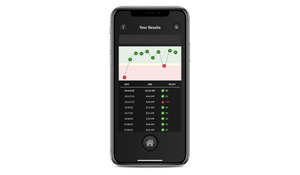Today, Amazon Announced that it Will Significantly Curb its Use of Pre-employment Drug Testing for Marijuana
As one the largest employers in the world, this means thousands of workers will no longer be required to abstain from cannabis for weeks before an interview or chug detox drinks to remove remnants of THC metabolites from their system to prepare for a pre-employment drug test. For both medicinal and recreational users, this is welcome news.
For employers, an improvement in marijuana drug-testing policy was long overdue. With simultaneous spikes in drug positivity rates and labor shortages, it has become painfully apparent that pre-employment drug screening for THC might not be sustainable anymore.
As marijuana only remains entirely illegal in 6 US states, many other companies are likely to follow Amazon's lead. (Image source: Disa.com)
Increasing Drug-Test Positivity Rates in Pre-Employment Drug Testing
With rapidly spreading marijuana legalization, workplace drug-testing positivity rates are also on the rise. The news from Amazon comes just weeks after Quest Diagnostics released their latest statistics on workplace drug testing:
Seeing as the highest increases in marijuana and all drug positivity between 2016 and 2020 occurred in the transportation and warehousing industries, Amazon's move to adjust its drug testing policy was very timely. Clearly, traditional drug testing, including pre-employment drug testing, has not succeeded in providing a deterrent for workers to abstain from using cannabis, proving its ineffectiveness as a safety measure.
"Pre-employment or during employment drug testing has never provided an accurate indication of a person's ability to perform their job and yet this incredibly invasive practice has locked out millions of people who use drugs — both licit and illicit — from the workplace, " says the Drug Policy Alliance (NPR).
And "locking out" millions of people from the workplace is not an option right now.
Pre-Employment Drug Testing Exacerbates Labor Shortages
Hiring difficulties, labor shortages, absenteeism, and turnover is at an all-time high:
- "Worker absenteeism...and difficulties in filling open positions continue to be issues that limit manufacturing-growth potential.” Timothy Fiore, chairman, Institute for Supply Management's Manufacturing Business Survey Committee. (Machine Design)
- “...significant difficulties in attracting and retaining labor at their companies’ and suppliers’ facilities.” (Machine Design)
- "Truck drivers are impossible to find even after a hefty increase in hourly wages and loading docks at warehouses are keeping trucks idle as there aren't enough workers." (Reuters)
- "Construction payrolls were flat. With workers scarce, employers boosted wages and increased hours for employees. Average hourly earnings jumped 0.7% after dipping 0.1% in March. The average workweek rose 0.1 hour to 35 hours." Reuters
Of course, the COVID-19 pandemic has contributed to the pressure felt by these industries by directly influencing drug-positivity rates and exacerbating labor shortages.
According to the CDC, 40% of US adults reported struggling with mental health or substance abuse in June 2020. With the rise of these issues, workplaces are looking for more proactive and comprehensive ways of identifying impairment, such as real-time cognitive impairment testing.
They realize that as they reject many qualified applicants because of traces of THC in their systems identified in pre-employment drug tests, their other employees are silently impaired due to burnout, stress, fatigue, and mental distress.
Relieving workers who were impaired in real-time of their overtime was a challenge because not only were applicants failing their THC screens, few were applying in the first place:
"...The pandemic has forced so many people out of the workforce...Overall, our findings reveal that the labor market situation is worse than some headline numbers suggest" according to the San Francisco Federal Reserve Bank, (Reuters).
With Labor Shortages and Drug Positivity Both Reaching All-Time Highs, Change was on the horizon for Pre-Employment Drug Testing and Amazon Took the Lead
For Amazon, the shift in policy represents a giant step forward in hiring practices. As marijuana legalization spreads across more states and positivity rates on pre-employment drug tests continue to rise exponentially, hiring workers who can pass the THC screen has grown almost impossible.
So, now what?
Cognitive Impairment Testing is a Viable Substitute for Screening Applicants with Pre-Employment Drug Tests
The first digital cognitive impairment tests were invented in the early 1980s.
First came the psychomotor vigilance test, a measure of reaction time lasting up to 20 minutes. NASA used it for their astronauts but it wasn't suitable for the workplace.
Then came wearable devices, cameras, pupil-trackers, brain wave detectors. They were invasive and workers didn't like them.
Somewhere in between, the AlertMeter® has created--a 60-second game-like cognitive impairment app. It was fast, it was easy, the workers liked it, and most importantly, it worked.
Around the same time the AlertMeter® entered the safety market, Colorado legalized recreational marijuana.
Many safety-sensitive workplaces instantly felt the brunt of this social change--hiring difficulties, reduced morale, higher turnover, and more dismissals due to random drug tests coming up positive for THC.
Companies that embraced the shifts in drug testing policies, such as removing marijuana from pre-employment drug tests and reducing or eliminating random drug testing, often go on to experience significant organizational improvements upon adding AlertMeter® to their safety culture initiatives.
These results were verified by one such company's insurance provider:
- 70% reduction in worker's compensation claims
- 90% reduction in drug-testing costs (due to the elimination of random testing)
- 35% reduction in worker turnover
- 11% improvement in productivity
Now that Amazon has set this new precedent for the manufacturing and transportation industries, more companies are likely to follow suit. Otherwise, they risk losing more employees to Amazon, where they won't be required to get pre-employment marijuana tested. These industries cannot afford to lose more employees on top of the labor shortages they've already experienced this year. It has been less than 24 hours since the announcement from Amazon was released and here at Predictive Safety, we're already seeing the rush.



